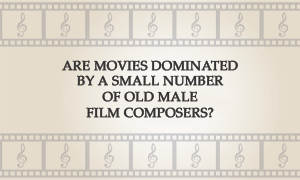 Last week, a reader emailed to ask “How many composers actually work in Hollywood?!” They then added: “It seems to me the same old men score all the movies”.
Last week, a reader emailed to ask “How many composers actually work in Hollywood?!” They then added: “It seems to me the same old men score all the movies”.
It’s a great question so I thought I’d take a look and, along the way, see what else I could discover about film composers.
I used my dataset of all films released in US cinemas in the thirty years between 1988 and 2017 and focused on everyone who received a composer credit.
Top composers rule the sector
Across my dataset of thirty years of movies, 4,749 people received a composing credit. The vast majority of film composers did not work on another film after that initial credit (although they may have worked on other types of content, as I address in a later section). Fewer than a third received two or more composing credits and only 204 people received more than ten film composing credits – that’s just 4.3% of film composers. 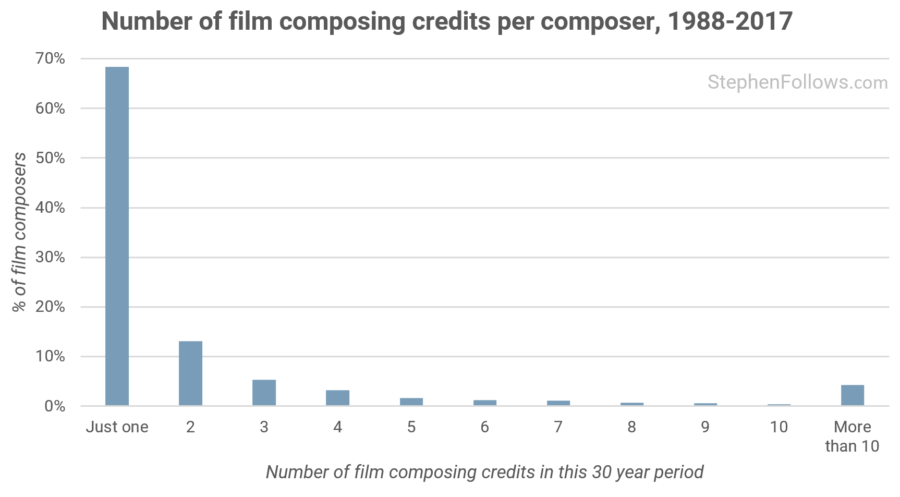 A small number of prolific composers do indeed dominate the marketplace. Hans Zimmer has scored 112 films over three decades and those films have grossed just shy of $30 billion at the global box office when adjusted for inflation.
A small number of prolific composers do indeed dominate the marketplace. Hans Zimmer has scored 112 films over three decades and those films have grossed just shy of $30 billion at the global box office when adjusted for inflation.
In fact, the top 20 film composers (as defined by total box office gross) account for 48.2% of all the money grossed in the movies studied over those three decades. 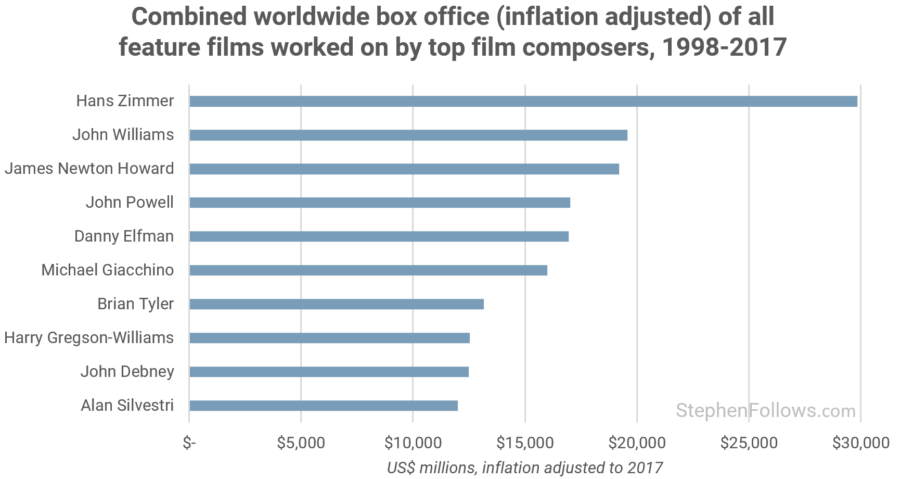
Managing to score well into their 50s
The reader suggested that film composers are “old”. This is a highly subjective term and I’m not seeking to litigate that here. What I can do is look at the median age for composers and see how that compares to the median age for other roles.
I collected dates of birth for my composers (where available), which allows us to look at how old they were when their films were released. The median age of film composers on the top 200-grossing movies (1988-2017) was 46.6 years old. This has been steadily rising; the median age in 1988 was 41.4 years old but by 2017 it had grown to 54. 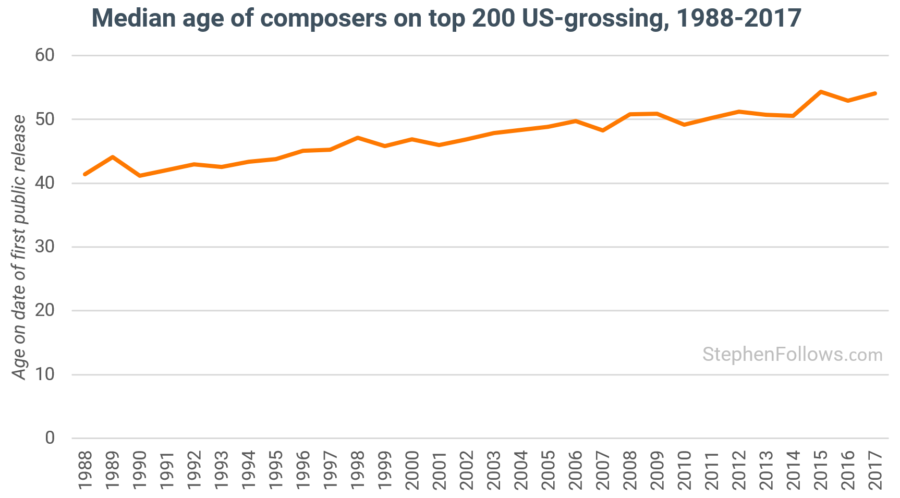 Among the youngest composer in my dataset was Markéta Irglová who was just 19 years old when Once was released, in which she starred, as well as singing and composing. She jointly won an Academy Award for Best Original Song.
Among the youngest composer in my dataset was Markéta Irglová who was just 19 years old when Once was released, in which she starred, as well as singing and composing. She jointly won an Academy Award for Best Original Song.
The oldest is uncertain as dates of death are harder to find than dates of birth. It’s not possible to know if someone was old when the film was released or had already passed away. Composers can receive credits on movies long after they have… well, started to decompose. One such example is Bernard Herrmann, who is the sole composer credit on the 1998 remake of Psycho, despite dying 23 years prior.
A few years ago, I researched the age of writers, producers and directors so I can compare the composers’ data to those roles. My original studies were only for the top 100 grossing movies but they still provide an interesting comparison. In 1995, all of the ages were pretty similar but as time has gone by, the median age of producers and composers has increased faster than that of other roles. In 1995, composers were the youngest of this group whereas by 2014 they had become the oldest. 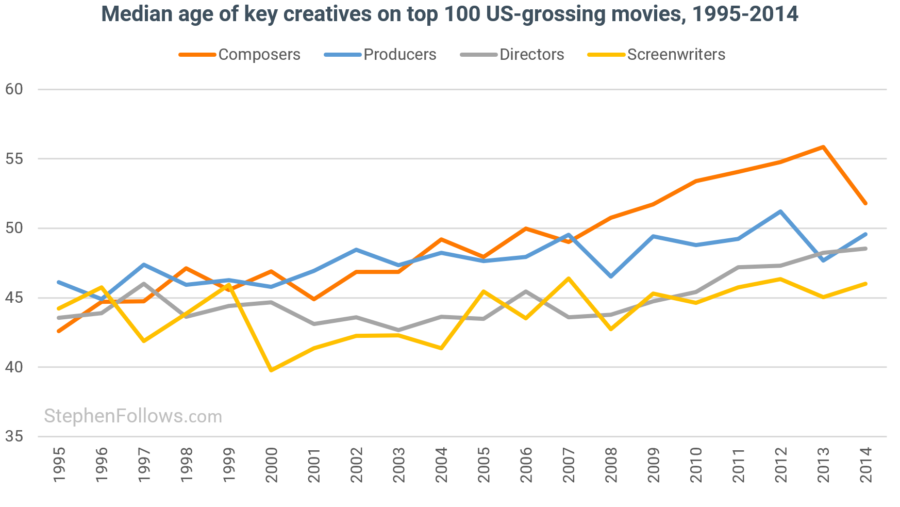
19 out of 20 film composers are men
In my past gender research, I have uncovered the massive gender disparity among film composers so the following section won’t come as a surprise to my regular readers. In 2017, men accounted for 95.3% of all composers on feature films. Other male-centric roles include cinematographers (92%), directors (84%) and writers (83%). 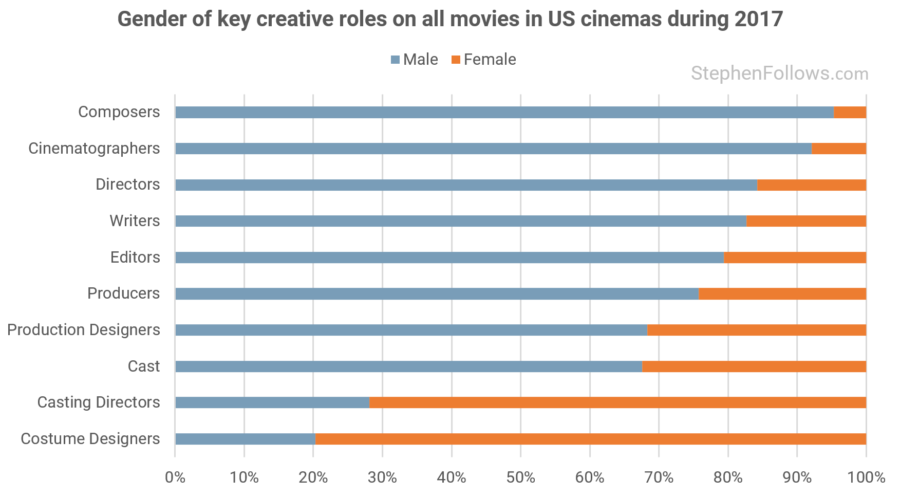 Over the past three decades, men accounted for 96.1% of film composing credits.
Over the past three decades, men accounted for 96.1% of film composing credits. 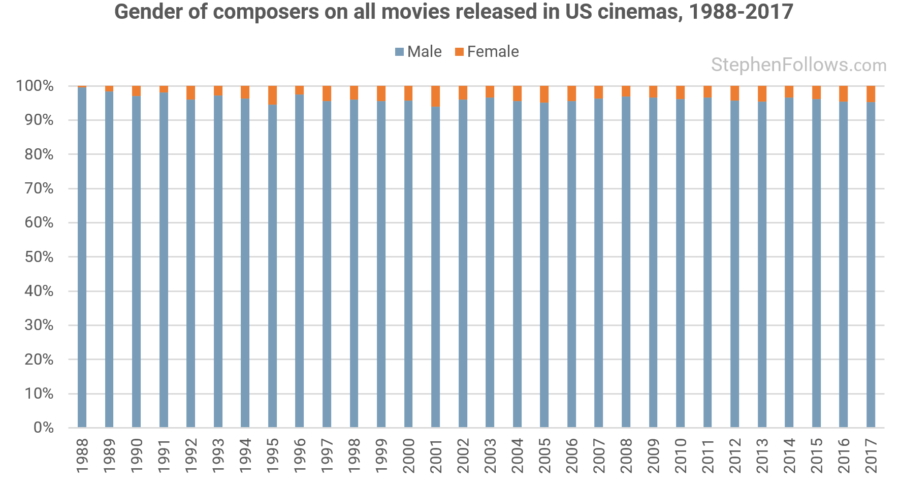
Where are they coming from?
Despite the fact that 68.3% of the movies in my study were American, only 38.5% of the film composers who worked on them were born in the United States. 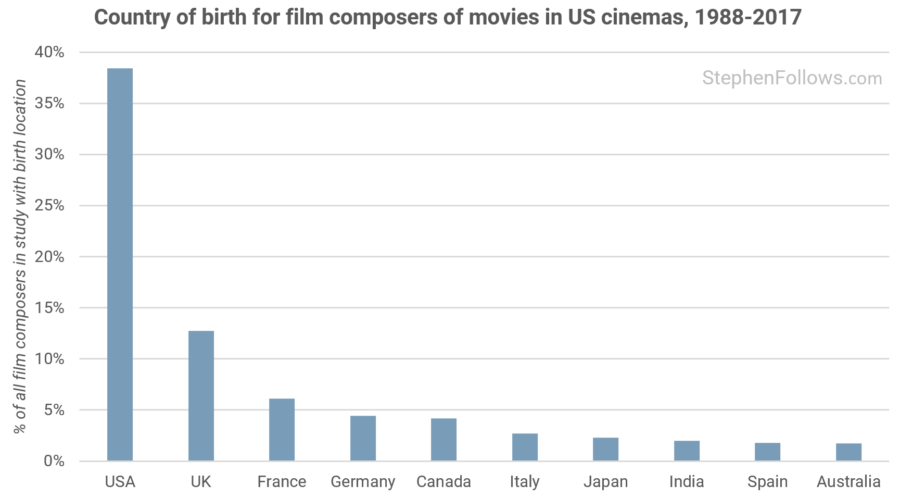
What else can they do?
Let’s end our journey looking at what other things composers have done outside of scoring feature films. The majority of composers also received credits in the music department on my dataset of films, such as playing an instrument or conducting. After music-related jobs, the most common other credit was that of producer, with almost a fifth of film composers also receiving a film producing credit at some point. 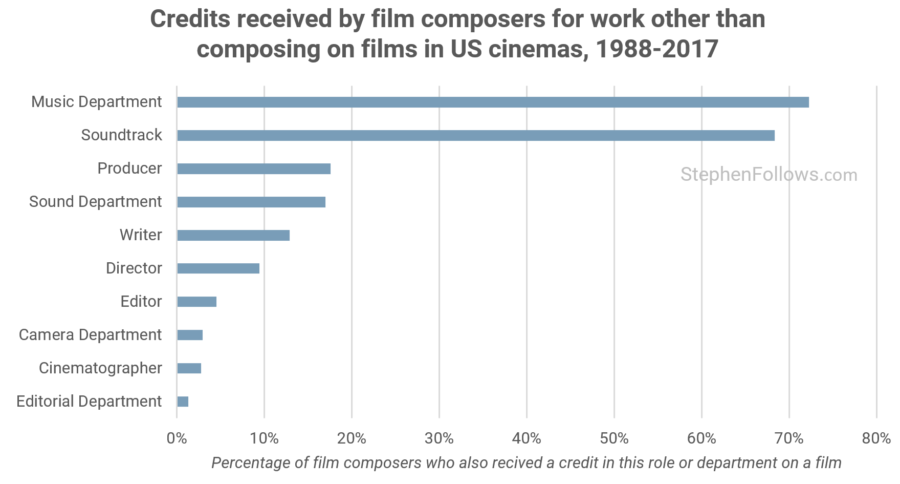 Finally, outside of the films in the dataset, composers have also created music for other types of productions. Two-thirds of feature film composers have also composed music for short films. Just over half have composed for TV shows and documentaries, but only 6.5% have also composed for video games.
Finally, outside of the films in the dataset, composers have also created music for other types of productions. Two-thirds of feature film composers have also composed music for short films. Just over half have composed for TV shows and documentaries, but only 6.5% have also composed for video games. 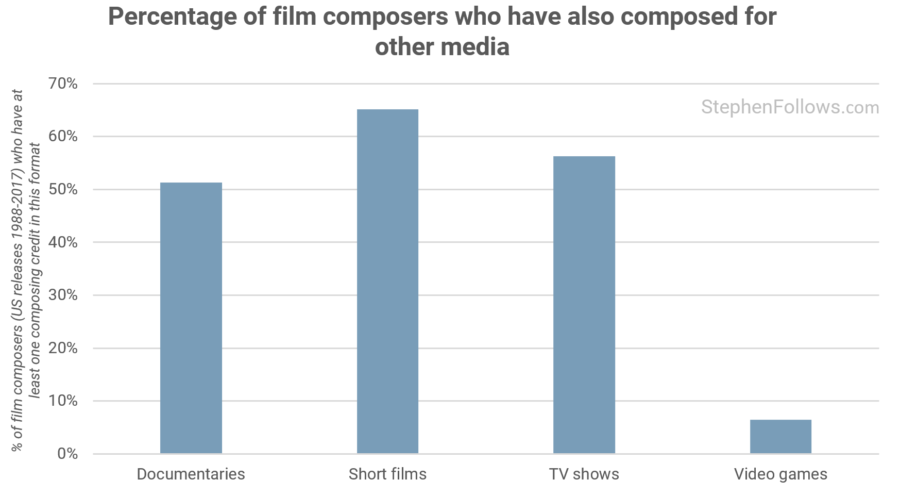
Notes
The data for today’s research came from IMDb, Wikipedia, Box Office Mojo and The Numbers / Opus Data.
Dates of birth for less well-known composers are tricky to find. Overall, I found dates of birth for 58.9% of composer credits on all films and 75.7% on top 200 grossing films. There is obviously a strong bias towards better-known composers, meaning that the average age of all composers working is likely to be slightly lower. This is why I narrowed in on the top grossing films in the age charts above.
All talk of ‘ages’ relate to the age of the composer on the date of the first release, typically the US theatrical release. The actual work of composing will have been completed within a year of release and so if you are more focused on the age of the composer when they started work on the film, then a rough rule of thumb would be to remove a year from the ages shown.
To determine a composer’s public gender, I used publicly available data, pronouns (such as in biographies) and first name analysis (i.e. if 99% of people called Daniel are male then I have regarded every Daniel with an unknown gender as male). I appreciate that this research takes no account of gender fluidity or other forms of self-identification. That’s not a conscious choice but rather a consequence of doing research at this scale. If anyone can suggest a way of taking this on board in the research process then I am very keen to hear it. Please drop me a line and we can talk it through.
If there was anyone for whom I could not reliably determine a gender, then they were not included in the charts which show a percentage split between male and female composers. Although this is not ideal, I have no reason to think that these people skew towards one gender over another, and they were also a small percentage of my overall dataset. For the vast majority of the period I studied, composers are extremely likely to have publicly identified in a binary manner, no matter their true feelings or identity. This research speaks to how composers are judged from the outside and that it’s the public-facing gender identity which matters most when it comes to discrimination.
The location of birth chart combines variations of countries into their current country, eg people born in both East and West Germany are listed under ‘Germany’.
Epilogue
Thank you to the reader who asked the original question but who wanted to remain anonymous. It’s been over three years since I last looked at ages and during that time my research skills and methods have improved. Therefore, when comparing my new data to the old data for the age of writers, producers and directors I feel that something is lacking. If you would be interested to see me go back and re-do the original age-related research to a deeper degree, drop me a line.

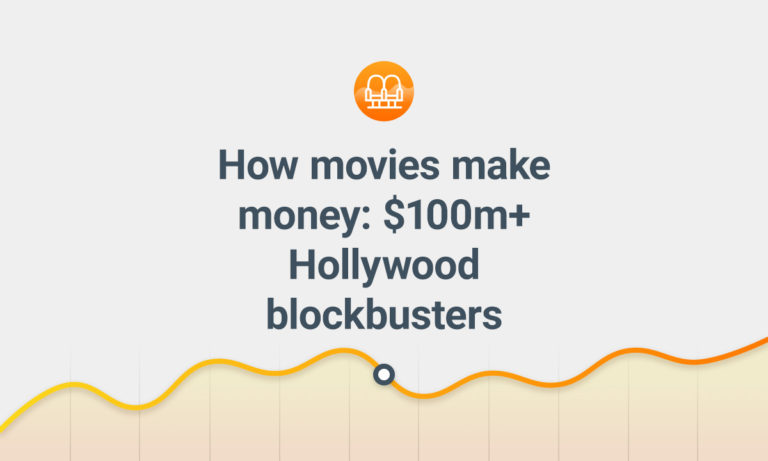

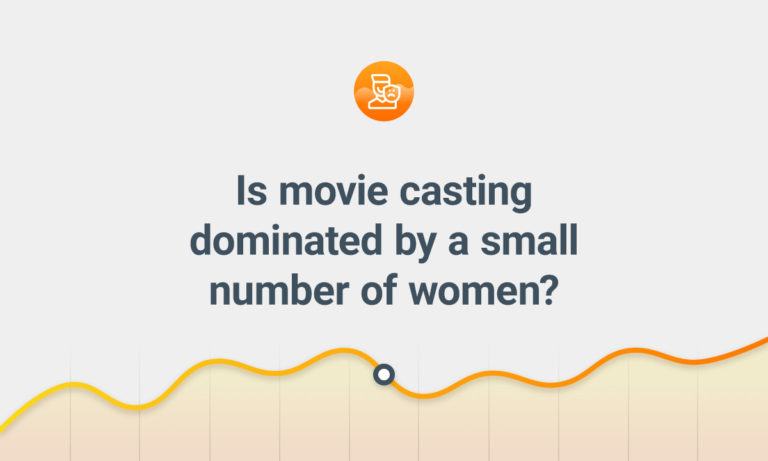

Comments
Thanks for this Stephen. Really fascinating read as ever.
There are good reasons why composers of movie scores are older than most people imagine they should be – it takes a few decades to learn how to write a movie score!
Most aspiring composers imagine that the score writer sits alone in his or her home studio, scribbling away on staves, whilst tinkering on a piano. Whilst this may be true for a small part of the time, most of the work involves being an integrated part of the team that makes a movie. That means being in a studio, with the director and often many others, ‘spotting’ the cues and working on the sound.
Most score writers start as arrangers and/or music editors and they are the ones that the editor goes to, to tell them that 3.5 seconds have been taken out of scene 18 on page 57, so the music has now to be 3.5 seconds shorter!
“As the orchestra has already been recorded, you are just going to have to do your magic in the computer!”
That means that our aspirant Hans Zimmer wannabe will have to have had a very good musical education and probably will have completed an MA in composition or some other relevant education or experience in composition and orchestration. This will be followed by many, many years as a music editor, an arranger and then, if he or she is very lucky (and very good!) as a composer of incidental music in a movie.
After a few decades of grinding away at incidental music, they might just possibly land a gig, writing a TV theme.
Somewhere in all that journey, they are going to have to pick up an agent if they are to stand even a slight chance of landing a serious movie commission. Without an agent, they stand absolutely no chance of landing ‘The Big One’ unless they get unbelievably lucky or ‘know someone’!
All the above takes time and that pathway to success is taking longer and longer and that is why composers of movie scores are seldom Spring chicken and are getting older!
Writing movie scores is probably a far more competitive field than any other in the movie business and anyone contemplating taking time off for raising a family will just fall by the wayside – very few women are prepared to make that sacrifice and I for one cannot blame them!
This was not the route that Hans Zimmer took though, some people in the industry just happened to be at the right time at the right moment, even Hans Zimmer himself started in the industry without having music education and some people even said that he did not learn to read music until later years. It is true that the film music world is very competitive, but the platforms to discover new talent is still extremely closed.
fascinating! very surprising that Alexandre Desplat is not listed in box office earnings for top composers
david
Thanks. He’s 13th with $10.23 bn
So what ? this system is rewarding the best and the smartest !
Would you rather it rewarding mediocre composers ?
First of all, logically you are wrong, of course older composers have more money, it’s because they have more movies composed, who would have thought !
younger composers are still composing their first movies !! how is it fair to compare older gentlemen to young ones
I mean sorry to break it to you but Older people have more experience in work than young people ! more savings to !
because they’ve been doing it for years…
SHOCKER am I right !
The best is getting the best I wouldn’t want it any other way !
Why don’t people stop complaining and start working hard, and how about listening to the music these legends created instead of focusing on this meaningless noise, and stop with the “old & male” specification it serves no one to create a devide that doesn’t exist.
Are you telling me that a person would be enjoying music from a movie and then OH he decides to stop listening because the composer is a female ? WOW talk about a propaganda…
A lot of young coposers are in the top Ramin Djawadi, Brian Tyler, Jasper Kyd… and the list goes on and on
why don’t you understand that if you’re good you’re going to get recognition ??
Also as a previous comment mentions it takes time (sometimes decades) to master composing movies OSTs
According to you, you want a 23 years old composer to do one movie and it to be fantastic and get him more money than a 30 years old career… yeeaaah Right !?
I’m surprised you didn’t add “white” to the “old male” would that give your intentions away ?
Seems to me that this a compliant from a butt-hurt leftist *mom’s basement living* masturbating Loser.
I think you do not understand the basic problem in the film industry, the problem is that there are not platforms to even get know if a composer is talented or mediocre, can you tell me of a place where a composer can send work or reels to be considered for a project ???? Not a lot right, ok you may say competitions, that could be an option, but believe me, the film music world is extremely closed and centralized, and yes it is by white old men, I do not mind that but it is 2021 cmon. There are talented people all over the freaking world
Having worked with one of the top composers in Hollywood (multiple Marvel movies, action films, top television series credits to his name) I can provide some insight into why the statistics above represent a corrupt system and not the meritocracy fantasy described by Andrew Graeme and Hunter Williamson.
I hired the A List Composer to score a motion picture. We spotted the film together (“spotting” is the act of watching a film and noting where musical cues will be located throughout the film, then discussing emotional objectives for those cues and overall instrumentation for the film). However, he quietly farmed the entire score to one of his employees, a woman who has worked for him for nearly 15 years.
At first, I thought this was a personal assistant. It was presented in a fashion that made it sound like the composer was busy and she was merely responding to my questions and getting his responses back to me. Over time, it became clear she was the actual composer. To test this, I started calling her the composer. We had several private conversations and in them I’d say things like “So, I’m assuming you’re working solo on this project, correct?” And she’d say “Yes, XXX is allowing me to run with this one.” “You’re writing the music?” “Yup.” “You’re mixing it?” “Yes.” “What’s XXX doing?” “Well, he’ll do a final review at some point.” “Okay. Good to know.”
We got to a point where it was time to clarify how I’d attribute the composer in the closing credits. And I deliberately behaved obtusely. “So, should we list YYY first or XXX first?” There was silence. XXX was angry. “My graphic designer already has placeholder closing credits, but I wanted to clarify so we can lock the text and do final animation.” No response. “Seems to me it should be YYY and XXX in that order?” Begrudgingly, XXX agreed that YYY should be listed first.
But, what was told to me later is that XXX will never work with me again. His intention was to be listed SOLELY by himself as the composer. The woman who actually scored the film was supposed to be anonymous. Her name has been used a few times, but always as the secondary composer or a demotion like “additional music by.”
The woman I’m speaking of has a masters degree in music composition. She is one of a handful of composers who work in the famous composer’s stable. This is an accepted practice by many composers. The industry completely accepts the practice of exploiting non-famous composers and trapping them in this position while the established composer takes credit for their work. The excuse is something like “Hey, it takes an army to do these films!” And that might be true if the junior composer was doing some hyper-specialized task or organizing files…but, it has become increasingly common for the “junior” composer to do all of the work and the famous, credited composer to do little more than listen to a final mix and rubber stamp it.
I’m choosing not to name the composer or his subordinate composer because this is an industry-wide practice. But, let’s not pretend that the system empowers talented people to rise to the top. It is the opposite; the industry turns a blind eye to this corruption. It is not a meritocracy. It is exploitation.
I’m also deliberately changing my name. But, if Stephen Follows wanted to verify me, I’m happy to explain the names involved in this situation to him personally.
God, this is awful
Stephen, thank you for this article. I really appreciate your hard work and research; however, I have a question: would you be so kind as to conduct a study of only minority composers? I’ve noticed that the industry is expanding its opportunities for minorities, but primarily for white women. However, I do not see as many opportunities for other minorities, such as Asians, black women, Hispanic/black men, and so on.
Thank you